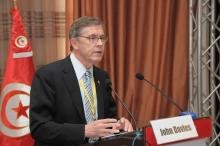Intel VP gives keynote speech at African education ministers’ forum on ICT in Tunis

Africa has the youngest population in the world, so it is no surprise that education is central to the development of the continent, which has been demonstrating record economic growth over recent years.
But obstacles lie in the way of education development in Africa, because of shortages of teachers, infrastructure, geography, access and other problems. One solution is the integration of information and communication technology (ICT) into Africa’s education and training systems, a vice president of US computer and semiconductor company, Intel, told a conference in Tunis on 9 December 2013.
“Anywhere and everybody learning” was the phrase that Intel’s John Davies used to describe one of the solutions to Africa’s education gap on the opening day of the African Ministerial Forum on ICT Integration in Education and Learning.
The forum is co-organized by the Association for the Development of Education in Africa (ADEA), the African Development Bank (AfDB), the United Nations Educational, Scientific and Cultural Organization (UNESCO), the Organisation internationale de la francophonie (OIF) and Intel, under the auspices of the Tunisian government through its ministry of education.
Giving the forum’s keynote speech, “Education Transformation through ICT Integration”, Mr. Davies described how his company had introduced education solutions using ICT in various countries around the world.
So far, he said, 12 million teachers and 150 million students in 100 countries had benefitted from Intel’s teaching and learning programs.
Job creation was one of the goals of the programs, Mr. Davies said. Education led to entrepreneurship and entrepreneurship led to employability, he said. Education increased a country’s competitiveness in the world market place, he added.
He described Intel’s work on education in such diverse countries as Portugal, Venezuela, Bolivia, Argentina, Panama, Palestine, Egypt, Kenya, China, Mexico, and Lebanon.
He emphasized the importance of governments in promoting ICT solutions in education, describing how the Russian government intervened to encouraged publishers who were dragging their feet on innovation to improve education.
In Africa, Mr. Davies said Intel was now operating in 24 countries and the company had already trained 1.3 million teachers on the continent. Intel organized science fairs across the continent to reach out to African students, he said.
Intel programs took into account Africa’s particular geographical and infrastructure situation and stress the importance of solar solutions and remote learning, Mr. Davies said.
